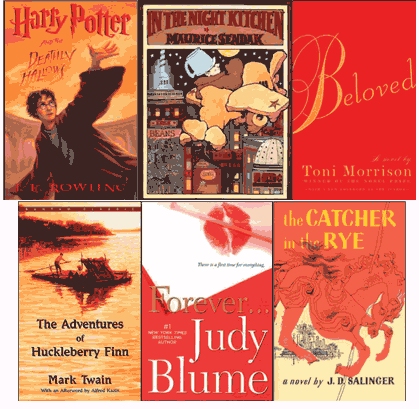Saturday is the last day of “Banned Books Week.” Every year the American Library Association publicizes the fight against book censorship, and releases a list of which books were most frequently challenged during the year. Stephenie Meyer’s Twilight series made the top 10, with objections about the book’s view on religion and complaints that it was inappropriate for young readers or too sexually explicit. Other “frequently challenged books” include classics like To Kill a Mockingbird, The Color Purple, and The Catcher in the Rye.
But a funny thing happened when I tried to download these books from the Kindle store. 7 of the 10 most-frequently challenged books simply aren’t available on the Kindle. The three you can download are:
1. My Sister’s Keeper by Jodi Picoult
2. The Perks of Being a Wallflower by Stephen Chbosky
3. Stephenie Meyers’ Twilight books.
But here’s the seven you can’t download.
ttyl; ttfn; l8r, g8r (series), by Lauren Myracle
And Tango Makes Three, by Peter Parnell and Justin Richardson
To Kill a Mockingbird, by Harper Lee
The Catcher in the Rye, by J.D. Salinger
The Color Purple, by Alice Walker
The Chocolate War, by Robert Cormier
The Earth, My Butt, and Other Big, Round Things, by Carolyn Mackler
As an avid Kindle reader, it’s left me feeling a little left out. This week the American Library Association is urging a celebration of the freedom to read, suggesting a variety of activities, many designed for schools and public libraries. (For example, “Draw a picture of the one book you would save if books were being burned…”) They suggest essay contests and discussions, and even making a poster that celebrates students who dare to read books banned elsewhere in America. But they also urge “Exercise Your First Amendment Rights,” at the bottom of one web page. “Read a Banned Book!”
Fortunately, there’s a lot more banned books to choose from. The American Library Association has cataloged more than 11,000 attempts to ban books over the last 20 years — and over 1,000 different books that have been challenged since 1982. They also believe that there’s many times more, estimating that over 70 to 80 percent of the challenges aren’t even reported. In fact, there have even been attempts to ban 46 of the top 100 Novels of the 20th Century.
But there’s at least one banned book on that list that’s available only in Amazon’s Kindle store: the special 50th Anniversary edition of Lolita by Vladimir Nabokov. It’s a controversial book about an aging literary scholar who’s sexually obsessed with a 12-year-old girl, though I’m not sure if that’s why it isn’t available elsewhere. When Amazon announced their new $139 Kindles, they touted it as one of “many digital books exclusive to Kindle” (along with UR by Stephen King). And another Kindle store exclusive is Midnight’s Children by Salman Rushdie — which also appears on Radcliffe Publishing’s list of the top 100 novels of the 20th century.
Apparently right now there’s two reasons why you can’t read a book: because it’s censored – or because it’s not compatible with your chosen brand of e-reader! But digital readers can also help circumvent the censorship. I was excited when a traveler told me how their Kindle let them bypass government censorship of the internet in China! And if a library is pressured into removing a book, it may be available for downloading onto your Kindle.
Now every Kindle is a private, personal library – free from any pressure from your local book-burners…
Maybe this is the right time to think a moment about how we can preserve our “literary heritage”. In 1424, the Cambridge University library only had a total of 122 books in their entire collection, according to one history class I took in college. And in fact, during the first 1,000 years of European history, there were less than 8 million books in existence. At some point in our own lifetime, we may eventually be asked to make a choice about which books we’ll preserve in the new 21st-century formats.
I guess I’m hoping that the answer…is all of them.
